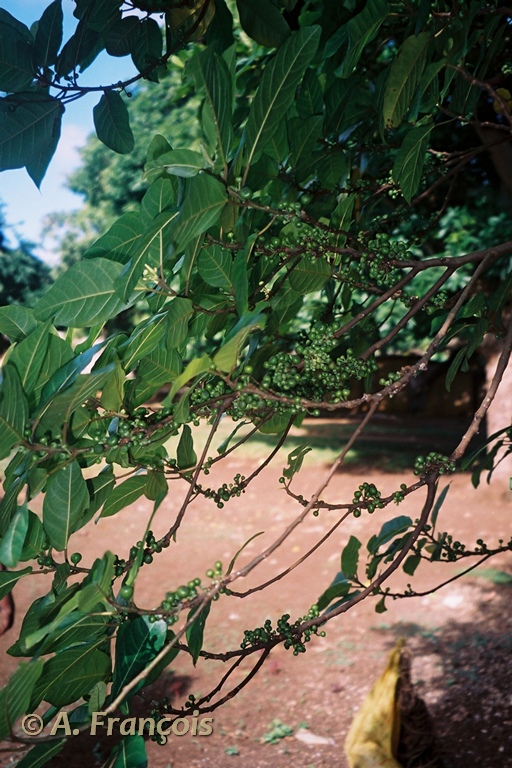l-1 subject prefix
variant of 3rd plural irrealis prefix le-, elided before a vowel
| Kape le-kotu le-le l-opogo l-abu le-vio ne ero waini.We'll run and jump down into the river. |
POc*alap
take ‹one thing› (vs. ~loko, ‘take several things’)
1 – take ‹s.th.› physically, grab, carry
| Leka, kape u-la ngatene u-mini susuko tae. Kape u-la u-teli, ka ini ka i-la.As for your (opp.-sex) cross-cousin, you cannot give her anything directly. You just put it down, and she'll pick it up. |
| I-ko i-la abo ne kaipa i-ko i-romo abo i-ko pi-tavie we tae.He wants to draw [lit. take] your blood and examine it to see if you are sick. |
2 – espoften first verb in serialisationtake ‹s.th.› in order to use or move it. Serves to introduce a new participant in a situation, often an instrument or a theme, even when no actual ‘grabbing’ event is referred to.
| Abu u-la kangele teuko u-kamai![take a fishhook and bring it] Please bring a fish-hook! |
| Li-la ruene li-tabo li-bono.[they ‘take’ the door and shut it] They shut the door again. |
| U-la teili u-bi ñ‘ eo.Just take a fan and fan yourself. |
| Ai' iape kape i-la men' iape i-koioi ne Toplau.The father would introduce his son into the Men's House [lit. would ‘take’ his son and introduce him]. |
3 – switch-subject serialisationforms causative constructions with motion or posture verbs
| li-la i-avo → ~laiavo[they take it hangs] they hang s.th. |
| li-la i-abu[they take it goes down] they put s.th. down |
| li-la i-koie[they take it enters] they put s.th. in |
| Vilo pe i-bu, ni-la enga ene i-wene ñei.I left my name on a dead tree. [lit. I ‘took’ my names it was left there] |
| Nobwogo miko i-la i-wai moe ne.Last night [an earthquake ‘took’ and shook this house] this house was shaken by an earthquake. |
4 – give ‹s.th.›
| U-la i-ka kiane![take it it comes quickly] Give it to me, quick! |
| Program kula idi li-la moli.Some software programs are free [lit. people take/give them unconstrained]. |
| Taluaito i-la ero ie menu apilaka.The doctor gave medicine to the little child [lit. he took/gave the child's water]. |
📘 Usually followed by ~mini* to introduce the recipient.
6 – s.o.understand ‹s.o., s.th.›
| Ka ni-la awa eo.[I took your mind] I understand what you mean. |
| Ai-la ene?[did you take me?] Did you get my point? |
| Bwara ni-la eo susuko tae.Maybe I didn't understand you properly. |
7 – actionrequire, take ‹amount of time›
| I-la wik iune!It takes a whole week! |
| Li-bo kuo votobo pe i-la moro tete we teva.Making a canoe can take up to three or four days. |
8 – do, make. Combines with certain objects, to form semantically non-compositional phrases
| ~la ngatene ‘take things’ = work |
| Nganae pe kape le-la tae.They don't need to work. [lit. there isn't anything they have to ‘take’] |
(?) + luro ‘coconut’
Flora
coconut skirt: cloth-like fibrous material at the base of the coconut tree
synonymnuko
labaro laᵐbaro noun
1 – husk of a coconut; esp. coir fibers in the husk
| Li-mali iawo ne lema awene pwo, semame añaña longe me labaro.You light a fire down in the oven, with small firewood and coconut coir. |
seetenuro
Averb, transitive
1 – hold ‹s.th.› in o.'s hands; grab, grasp
| La-labu ma kia.Let's shake hands. |
2 – raretake ‹s.th., s.o.› in o.'s arms
| Nga u-kila ini, kape u-labu u-lui ne moe iono.If you marry her, you will carry her all the way to your house. |
synonym~la ①
3 – touch ‹s.o.›, have body contact
| Leka, kape u-labu ebele ini metae. Nga u-romo ini we u-labu ini, kape u-kila.With your (opp.-sex) cross-cousin, you are not allowed any body contact. If you ever touched her, you'd have to marry her. |
4 – espmassage
| Ne-labu ebel' ini pe nengele i-meli.I'll massage her body because some spots (on her body) are painful. |
5 – abstrhandle, treat ‹s.th., s.o.› in such and such a wayhandle ‹s.o.› in such and such away
| Pe-labu pi-ejau, pe-somoli etapu!Handle it carefully, don't damage it! |
| ~labu motoro [lit. hold s.o. heavy] respect s.o. |
Bverb, intransitive
Cf. ~labu ngatene
common registergrab s.th.eat, have dinner
| Sa eo moli, u-labu!If your belly's empty, grab (something)! |
lai- laj- subject prefix
Grammar
dual subject prefix for “Collocutive”: 1st inclusive and 3rd person. Variant of la- ③ before a vowel, or for certain monosyllabic verb stems
~laiaini (i·)lajaini
Bverb, transitive
2 – change ‹s.o.›, have them put on new clothes
| Abu u-laiaini menu, awoiu kape u-mata ini me i-mokoiu.Come change the baby, and then you can rock her to sleep |
4 – answer, reply
| Ni-le ne ngogoro n-i, ia ni-lengi ngele i-laiaini tae.As I was walking in the forest, I called out, but I heard nobody reply. |
take s.th. it hangshang, hook ‹s.th.›
| Ne-la mangamanga 'none i-avo.Let me hang my towel. |
| U-la lusa eo i-avo ne tero.Hang your shirt up on the string. |
| Le-la i-avo korone nara i-sabu.We must hook (the bait) firmly for fear it might fall off. |
MorphologyThe sequence ~la i-avo is sometimes contracted into a single verb ~laiavo* ‘hang, hook+’.
~laiavo (i·)laiavo verb, transitive
Contraction ~la … i-avo
hang ‹s.th.›
| U-laiavo lusa ene (i-avo) ne tero.Please hang my shirt on the string. |
| Telau, ini topola iote pe li-laiavo ne toplau, peini none we dapa gete.The food basket ‘telau’ is a basket that is put to hang in the men's club, keeping food for the young men. |
synonym~toulo
2 – throw away, get rid of ‹s.th.›
| U-laiui i-le!Throw it away! |
| Ni-bo beniawo ni-le ni-laioi.I collected the ashes and threw them away. |
synonym~iui
~lakau (i·)lakau verb, transitive
1 – s.th.stick to ‹s.th.›, as a stain
| Abwa vilo i-lakau lusa ene.There's tree gum stuck on my shirt. |
| Abo ne eo nara i-lakau namolo iono.Make sure your blood doesn't stain your clothes. |
Lale lale placename
Geo
Lale, a village on the west coast of Banie
| Kula ka i-ka se vono Lale, Ngama, Vono.Some people (from Paiu) had moved to the areas of Lale, Ngama and Vono. |
Aserial verb, transitive
1 – take and give togive ‹s.th.› to ‹s.o.›
| Taluaito i-la tongolukilo i-mini men' one.The doctor gave some medicine to my child. |
| Leka, kape u-la ngatene u-mini susuko tae.As for your (opp.-sex) cross-cousin, you cannot give her anything directly. |
| Li-votei i-wene li-ko kape le-la viko le-mini idi ia li-la li-mini tae.They promised to give money to people, but they didn't. |
| Ne-ko ne-la awis pine iakapa ne-mini tili’ akapa pe i-si diksoneri akapa.I’d like to extend our deep gratitude to our brother, for the dictionary he has written. |
contracted to~lamini
~lamini (i·)lamini
Bsecond verb, transitive
(take V) and give it to ‹s.o.›
| Awa ene ne-ko me le-la awis pine iakapa le-lamini tili’ akapa Dr Alex.I would like us to extend our big thanks to our friend Dr Alex. |
synonym~mini ⓑ▻①
~lanasu (i·)lanasu verb, transitive
bewitch, kill ‹s.o.› using sorcery
| Ini pe i-lanasu idi.He's someone who can bewitch people. |
| Noma li-lanasu idi ne ngatene engaenga: ebele nga namolo iaidi, viabasa idi, kula none aidi, viñe buioe aidi.In the olden days, killing someone could be done using a variety of objects, such as, their clothes, their hair, the food they left, the nut they chewed… |
~la ngatene (i·)laŋatene
~langatene
Averb-object idiom
1 – s.o.take thingswork, do some work
| Awis pine peini ngatene pe a-la ponu.Thank you for your efforts. [lit. for the things you ‘took’] |
| Nganae pe kape le-la tae.They don't need to work. [lit. there isn't anything they have to ‘take’] |
| Pe-le, pe-le pe-la ngatene! P-ae none! P-ae jebute!Come on guys, you should go to work! Go harvest food, go harvest taros! |
| Dapa Lovoko na li-ovei pe li-la ngatene iune.The Lovoko people are inclined towards mutual cooperation [lit. doing things together]. |
| Dapa li-ka li-loko idi li-lui li-ko le-la ngatene le-mini dapa.BlackbirdingThey used to come to recruit people who would then work at their service. |
| Basavono na, kuo demene ka l-ejau tae, pe li-la ngatene ñi pine tamwase.These days, outrigger canoes aren't being made any more, because they are too much work. |
~langiro (i·)laŋiro verb, intransitive
| Li-teli avtebe i-le i-le i-le, li-langiro adapa ponu.So they went to plant Colocasia taros; they did all the taro-planting they needed. [lit. they taro-planted theirs.] |
Synt.The verb is intransitive, as the verb root itself implies the type of taro. However, it is often followed by the possessive classifier (enaka).
Laperusi laperusi
Laperus
proper noun
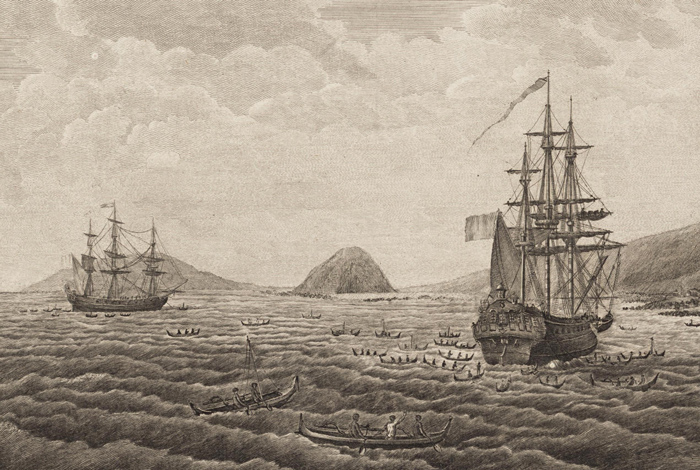
Fr.Lapérouse
Mythology
Jean François de Lapérouse: French navigator (1741-1788), whose naval expedition perished in 1788 on the southern coast of Vanikoro
| Li-atevo piene peini toñaki ie Laperus pe tamwaleko.Let's tell the story of how Lapérouse's ship was destroyed. |
| Laperus i-ka tev' kiapa ne kulumoe iakapa Vanikoro.Lapérouse came among us, in our island of Vanikoro. |
| Laperusi vana i-moloe i-si sivene ne nom’ ole tetake ne.Lapérouse had the habit of walking around, making some drawings on that beach over there. |
📘 Lapérouse (Laperusi) and his crew are central to a number of oral histories still told today on the island of Vanikoro.
The story of Lapérouse ✧ iepiene ie Laperusi
According to Vanikoro's oral tradition, Lapérouse approached the island aboard a double-hulled canoe (tepakare). The islanders feared that ship was coming to forcibly recruit people as work force; so they invoked their god Vilisao, asking him to destroy the ship with a double tornado. The ship split in two, one part sinking in the ocean, another part wrecking on the reef, off Paiou (Paeu). Some men survived the tempest, and remained on the island for some time, building a new ship to escape; one day, they finally out took to the ocean.
young coconut, good for drinkingCocos nucifera.
| Awa ini i-ko i-anu laro.He'd like to drink a fresh coconut. |
see lexical list atluro
~lateli (i·)lateli verb, transitive
Contraction ~la ~teli
put ‹s.th.› somewhere; put away, deposit, store
| Li-mabui li-ae tanoe, wako ka li-lateli teve.They quietly dug a hole in the ground, and put (the treasure) there. |
| Li-ovei pe li-la tepulu li-lateli ne teipu me le-su nga buluko.Kauri resin can be stored in an empty coconut shell, and lit as a lamp. |
| Ka ponu li-la viko, li-lui li-lateli ne moe ma tadoe.They took the ritual money, and deposited it in the gods’ lair. |
lava abilo lava aᵐbilo noun

Flora
sides of a snakek.o. bush liana (unidentified), whose shape is reminiscent of a large snake (abilo)
synonymkasule lava abilo
laviakome laviakome noun
Flora
handle of axek.o. seashore tree, whose hard wood is used to carve artifacts, e.g. for axe handlesScaevola taccada.
laviko laviko noun
pearls
| Dapa li-la laviko, namolo, kangele teuko, li-la li-mini kupa.They would take pearls, clothes, fish hooks, and give them to us. |
le1 le postverb
underneath; under ground
| Dapa damala li-ae tanoe le.The Westerners began digging up the ground, down under. |
(?) POc*lako
Averb, intransitive
1 – + locative phrasego somewhere
| Ia kela, kape ba-le vele?Where are you two going? |
| Ni-garei eo pe u-le re!I forbid you from going there! |
2 – first verb in serial pattern, with locative phraseintroduces a locative before the main verb, when previous motion is implied
| Ni-le ne revo nanana ni-romo meviko takataka.[I went to sea I saw…] I was at sea today, and saw a sea krait. |
| Le-le ne touro li-odo aero?[shall we go to the reef and seek shells] Shall we look for seashells on the reef? |
Phraseol.This syntactic strategy serves to “unpack” the various participants and complements of an action into separate clauses. The first clause with ~le ‘go’ introduces the locative complement, while the following verb presents the main action.
3 – first verb in serial pattern, without locative phraseget up and (do V): introduces a new action, whether or not involving a literal motion event. Not always translated
| La-le lai-ago telupe?Shall we go pigeon-hunting? |
| Nga mwaliko i-bu, dapa le-le le-iu ebele ini.When somebody dies, we bury their body. [lit. we go we bury the body] |
| Li-toe kuo wako, i-viñi dapa gete iape i-ko “Wako le-le le-katei.”Once they had carved the canoe, he told his youngsters: “Alright, let's drag it now!” [lit. we go, we pull it] |
| Pe-le pe-le pe-la ngatene!Come on guys, go to work! |
Bverb, oblique transitive
s.o.go tobelieve (s.o., s.th.: ne)
| Dapa li-le ne ene tae, ka ene ni-aptei ñe lek’ one.[lit. they didn't go to me] They didn't believe me, so I swore on my cousin's life. |
| Ene ni-lengi ñe taña ene, ka ebele piene, ene ni-le ene.I heard it with my own ears. It's the truth, I believe it. |
Csecond verb, intransitive
1 – serialised between two verbsseparates two actions that take place in separate locations. Usually not translated
| Ni-bo beniawo ni-le ni-laioi.[I collected ashes I went I threw them] I collected the ashes and threw them away. |
2 – after intransitive motion verb, same subject; foll. by locative phrase(move+) towards, to (such and such direction)
| P-aiu pe-wo pe-le ne ngogoro!Get up and run away to the bush! |
| Li-ovei pe li-pwalau li-le Iura ne tepuke.3pl subjectThey used to travel to (north) Vanuatu on their large canoes. |
| Li-aiu li-ke li-pwalau i-le iura.3sg inanimate subject[they rose they went-out they travelled it went south] They left (Vanikoro) and set off to sail southwards. |
3 – after transitive verb, switch subject; foll. by locative phrase(take s.th.+) towards, to (such and such direction)
| Li-tabe i-le i-wene ne aeve me kokoro.[they carry (it) it goes it lies in the sun] They bring it out to lie in the sun so it dries up. |
| Ni-tabulu voko i-abu i-le ne gilita.[I rolled a rock it descended it went to the valley] I rolled a rock down into the valley. |
| Li-loko none i-le ne lema awene.We put food into the stone oven. |
| Ba-ko ba-katau ene le-le ne toloto?[you want you follow me we go] Do you guys want to follow me to the lake? |
4 – genwithout a locative phrase: directional use(move+) forward, ahead
| Ka li-kopu li-vene li-le.They decided to move camp uphill (ahead of their route). |
| Li-katei bavede i-vene ne iuro, peini me le-vesu i-ke i-le.They hoisted the sail up the mast, so they could sail away. |
| Ini i-opogo i-le i-vio re, ne lema aero ne makone pon.[he jumped he went he stood] He jumped in, and stood in inside the dancing fence. |
5 – directional use, deictic interpretation(move+) thither, away from speaker or deictic centre
| Abu u-kop' u-le!Shift yourself a little (that way)! |
| U-iui i-le!Push it forward! |
6 – fig3sg subject, referring to the actionit goes(do V) ahead, in a continuing manner; go on
| Ngele nga i-ko i-oburo buro ae pon, kape i-obur’ i-le.If someone wants to sing a song, he can (go ahead and) sing. [he'll sing it goes] |
| Kape ni-atevo i-le biouro metae.I won’t be able to speak at great length. |
| Ni-odo eo i-le ra bogo, ia eo a-te tae.I looked for you on and on till night, but you weren't there. |
seera ①
| Kape le-tabo le-katau na kiapa ponu.Let's retrace our own steps again. |
| Le-wamu kiapa ñe ini!reflexiveLet's hide away from him! |
| Dapa kula li-abu revo, me le-labu namuko.The others slap the (sea) water, in order to catch the fish. |
3 – generic plural subject (see idi): ‘people’, ‘one’, generic ‘you’. Sometimes translated with a passive voice in English
| Nga mwaliko i-bu, le-iu ebele ini i-wene ne kie ini.When somebody dies, their body is buried in a grave. |
| Toñaki pine pe kape le-ke le-lui ne ngamuli tae.It was not the kind of large ships that can go out into the ocean. |
| Li-vo aero i-dai, me kape le-mako ne to.They erected a fence around (the village area), for us/for people to dance in the middle. |
| Van' ni-wene ni-botongo nara kape le-punuo ñi.I sleep on (my money) so nobody can steal it. |
lea lea noun
fathom: measure of length
| Ni-nabe jokoro lea iune ka kula.I measured the bamboo to be one fathom and a half. |
| Wako li-ejau sowi pine. Bwara dapa li-ko lea tuo. Tuo tae: bwara uluko! Iune, tilu, tete, teva, tili, tuo, i-le uluko!So they made a large boat; perhaps six fathoms. No, not six: ten perhaps? One, two, three, four, five, six, all the way to ten! |
eyes, mata(my) eyes are hungrybe hungry
| Poi mata i-ledi.The pig is hungry. |
Lege leᵑge placename
Lengge, a place on the west coast of Banie
| Voko iote pon li-re ne elene Lege ponu.There was once a large stone down there, in the clearing known as Lengge. |
serialised; always 3sgit goes one(do) together, as one
| Kape le-vongo i-le iune.We shall eat together. [lit. we'll eat it goes one] |
| Teanu me Banie, damala li-kila i-le iune.Teanu and Banie islands, the Westerners call it with a single name [Vanikoro]. |
leka leka noun, kinship
1slek' one2sleka3slek' iape
Kin
1 – symmetrical termsame-sex cross-cousin (MBC, FZC): a man’s male cousin (MBS, FZS), or a woman’s female cousin (MBD, FZD)
| Awis, leka.from man to manThanks, my cousin. |
Anthropology
2 – symmetrical termcross-cousin of opposite sex (MBC, FZC): a man’s female cousin (MBD, FZD), or a woman’s male cousin (MBS, FZS)
| leka emelefemale cousin |
| Leka, kape u-labu ebele ini metae, kape u-romo ini tae. Nga u-romo ini we u-labu ini, kape u-kila.With your (opp.-sex) cross-cousin, you are not allowed any body contact, nor any eye contact. If you ever saw or touched her, you'd have to marry her. |
Avoiding your cross-cousin ✧ leka
The kin relation between opposite-sex cross-cousins (leka) is sacred (etapu) – associated with awe, fear and avoidance. Thus if I swear (~aptei) on s.o.'s life, that will be on my cross-cousin.
Any sort of contact between cross-cousins of opposite sex, whether eye- or body-contact, is strictly prohibited. If it ever occurs, then the two individuals must marry (~kila ②▻②). As a consequence, cross-cousins – who can be potentially spouses – avoid each other strictly. Mwasu, a mythological figure, infringed those rules, and caused a disaster on the island.
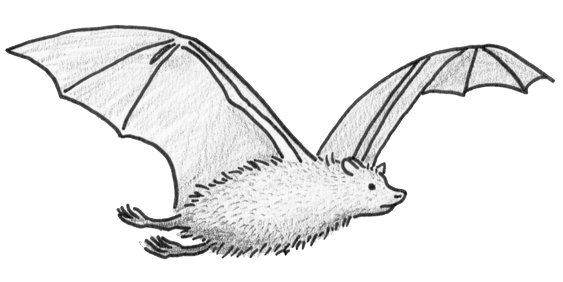
| Lekele i-nge wa vede.Flying-foxes chew fruits of pandanus. |
| Uña asodo dapa li-avo ne bonge, ia uña lekele li-avo ñei ma dapa ne vilo.Bats hang about in caves, but flying-foxes hang down from trees. |
POc*lalom
inside ‹of s.th.›
| lema mathe palm of the hand |
| Li-aneve lema mwoe, ka maro.They sweep inside the house, and outside too. |
| Ni-wowo revo i-ke mina lema kuo.I'm bailing out the (sea) water from inside the canoe. |
contraction of ~le moli* ‘go randomly’
1 – literalwander around aimlessly
| Ni-le moli ne kulumoe.I just wandered around in the village. |
| U-le moli nga pon etapu!Don't go around aimlessly like that! |
seemoli
~le ne revo (i·)le.ne.revo verb, intransitive
euphgo to the seago relieve o.s. in the sea; defecate
📘 Just like in other islands of the area, Vanikoro people use the sea as their toilets.
synonym~epe
POc*roŋoRhear, feel
Averb, transitive
1 – feel ‹s.th.›; perceive through senses or intuition
| Ni-lengi tanoe pe i-wai.I felt the ground shake. |
| Nganae kape li-lengi melia dapa ñe tae.Paradise[there is nothing by which they feel pain] Nothing can cause them any pain. |
2 – hear ‹s.o., s.th.›
| Ni-lengi mama gita.I can hear the sound of a guitar. |
| Iepiene pon na, ni-lengi tev' et' one.This story, I heard it from my mother. |
| Ene ni-lengi ñe taña ene, ka ebele piene, ene ni-le ene.I heard it with my own ears. It's the truth, I believe it. |
| Ka ni-lengi ni-ko dapa kula li-te tae.I never heard that there was anyone else there. |
| Ni-lengi Sintia ka i-kovi metele.I heard that Sintia is expecting. |
5 – somethear from ‹s.o.›, have contact with ‹s.o.› by phone or mail
| Labiou tamwase kia ka la-lengi kia tae.We haven't heard from each other for a very long time. |
6 – tropative construction, foll. by secondary predicatefind ‹s.th., s.o.› to be so and so, through hearing or feeling
| Buro ponu li-lengi wako tamwase.That song sounds beautiful. [lit. that song, they hear it very beautiful] |
| Li-lengi ebele dapa ka wako.They feel better [lit. they feel that their bodies are well now] |
| Kiapa ka li-pei kiapa, pe menuko iakapa dapa Frans.We are all delighted, because the French are our friends. |
| Dapenuo li-go dapa ñe tolosai; da viñevi li-ativi dapa ñe tekume.The men girt themselves in loincloths, the women in skirts. |
| Li-madau li-ko bwara kape le-ka le-loko dapa.They were afraid that they would be kidnapped. |
3 – generic plural subject (see idi): ‘people’, ‘one’, generic ‘you’. Sometimes translated with a passive voice in English
| moe pe li-apinu enekitchen [lit. house where one cooks] |
| jokoro pe li-viPan pipe [lit. bamboos to be blown] |
| Basavono po le-ko li-ago idi, li-katei puro i-ke ka li-ago.When you want to shoot someone, you draw out an arrow and shoot. |
| moro pe li-ve eothe day when you were born [lit. when one begat you] |
| Uk’ aidi, li-labu motoro.In-laws are to be respected. |
lo lo noun
Architecture
rafter: light beam extending from the ridgepole (pumene) down to the tie-beam (basadigo), forming the roof structure
📘 There are about ten rafters on each side of the roof. They rest on purlins (dienebe,womoe), and in turn support the sago thatch (sodo otovo).
loko1 loko noun

Flora
a plant (unidentified) with green leaves and scented flowers
| Dapa pe li-mako li-loko loko i-vio ne webwe iadapa.The dancers have stuck some loko leaves on their armbands. |
📘 These leaves are used for decoration, or worn by musicians and dancers # typically by sticking them on their armbands (webwe).
1 – typic. first verb in serialisationtake ‹several objects›, collect, esp. before displacing them somewhere
| Le-loko ajekele le-iui ne revo.They collect the rubbish and throw it into the sea. |

1 – firewood
| moe ma longefirewood house (where wood is stocked) |
| Li-mali iawo semame añaña longe.We light a fire with small bits of firewood. |
see lexical list atiawo
2 – rarewood, as material
synonymvilo
vomit, puke
| Basavono po mwaliko malaria i-vagasi, basa i-meli, mwaliko i-loro, panavono i-ke.When someone has malaria, their head aches, they vomit, they sweat… |
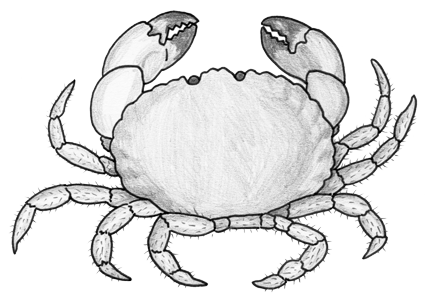
Fauna
crab
| ba loubocrab's claw |
| utedie loubo[backside of crab] crab's shell |
| ma loubocrab's hole |
| Loubo iote i-ke vidiviko ne ale ene.I had one of my toes bitten by a crab! |
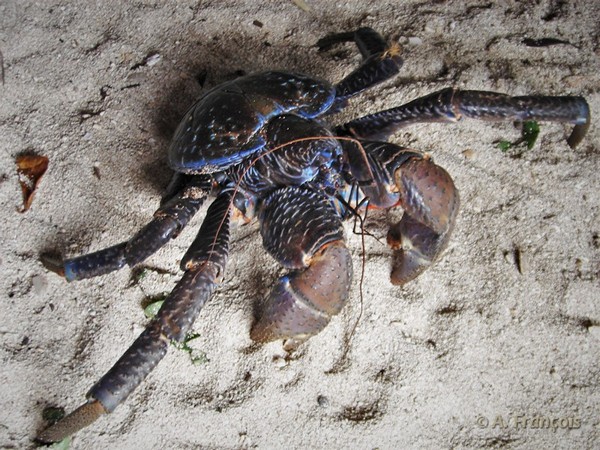
loubo ‘crab’ + (?)
| buia loubaidoabdomen [lit. testicles] of a coconut crab |
| li-labu louboaidohunt for coconut crabs |
~lovei (i·)lovei verb, intransitive
Redup~lolovei
non-sing subjectfall one after the other
| Luro i-lolovei i-abu.The coconuts keep falling. |
| Uie vilo i-lolovei i-abu ne tanoe.The dead leaves are falling on the ground. |
lovia lovia noun
part, section; storey
| Moe na, lovia tete.This house has three storeys. |
| Toñaki ie Laperus ponu, ae, tepakare. Lovia tilu, ne?Lapérouse's ship, you know, it was a catamaran. With two sections, you see? |
lovia vono lovia fono noun
section of the universeany one of different worlds or realms
| Kape u-re lovia vono na.You will leave this world. |
| lovia vono tete[three parts of the world] the three different worlds |
📘 The word marama, borrowed from Mota, is sometimes used with the same meaning.
lovia vono iote noun
the other worldthe world of the Dead; Hades, Paradise
| Basavono po li-bu, kape le-tomoe mina Lovia Vono na, le-le ne Lovia Vono iote.When we die, we leave this World, and migrate to the Other World. |
| Mata piene pon, i-wene moli teve dapa. Pe ponu ka li-le ne lovia vono iote.That life of theirs is easy. That's because they have reached Paradise. |
Lovoko lovoko placename
Cf. voko ‘stone, rock’
Geo
Lovoko or Lavaka, a village on the north coast of Banie island
LovonoVana
Cf. Vono
Vono or Lovono: a village on the north coast of Banie, together with its area
| piene adapa Lovonothe language of Lovono |
| Tadoe iadapa pon, enga ini – dapa Lovono li-ko ‘Visipure’; ka dapa Teanu li-ko ‘Vilisao’.The god in question was called – in the Lovono language, (they say) ‘Fisipure’; in Teanu, ‘Filisao’. |
📘 This village is also known, in the literature, under the names Vanou or Whanou (Dillon). Its local name, in the language Lovono, is Vana.
synonymVono
Food
scrape ‹tuber› or grate ‹coconut flesh›, with a bivalve shell (aero ②) or grater
~lu2 (i·)lu verb, transitive
fold ‹s.th.›, esp. in order to put it away
| Kape le-lu bete.They are ready to fold their mats. |
synonym~bu ②
~lu bete verb-object idiom
fold matsa funeral ritual taking place in the house of a recently dead person
Folding away the deadman's mats ✧ Li-lu bete
Idi le-bei bete awoiu, kape le-lu bete. Bete ka mwoe pon, ie mwaliko pe i-bu. Li-aneve lema mwoe, ka maro. Awoiu, le-loko ajekele le-iui ne revo.
At the end of the funeral vigil (~bei bete*), comes the time when we fold the mats away. These are the mats, and the house, of the person who died. So we clean the house, both inside and outside. We collect the garbage (including the mats) and we go throw them in the sea.
luene luene noun, relational
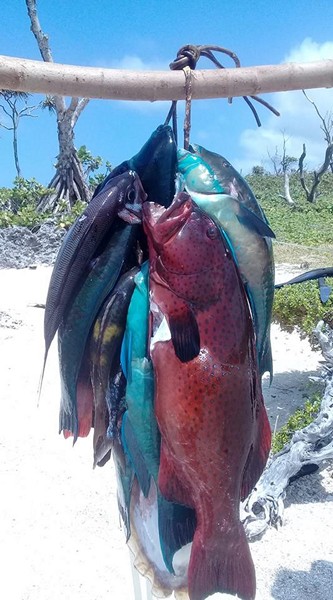
bunch of ‹fish› caught in a net, or threaded together on a solid string (tero) while fishing
| luene namukoa catch of many fish |
Carrying and moving ✧ ~lui
| ~lui | take away |
| ~kamai | bring |
| ~koioi | take in |
| ~kevei | take out |
| ~venei | take up |
| ~abui | take down |
1 – take ‹s.th.› somewhere, carry
| Ni-bu bete ene me ne-lui.I've rolled my mat to take it away. |
| Ini i-le i-la voko, i-lui i-la i-teli ne temaka iote.He [went to] grab the stone, took it away and put it down elsewhere. |
| Toñaki iadapa i-ka i-ka i-sava webwe i-lui.Their ships used to come here to buy troca shells and take them away. |
| Uña udo pe i-ako, li-lui i-avo ne tone.The ripe bananas had been [taken] put to hang from the hook. |
| li-lui nudurocarry the scareline, go fishing with the scareline |
2 – take ‹s.o.› somewhere or away
| Kupa pi-lui ini teve taluaito.We took him to the doctor. |
| Nga u-kila ini, kape u-labu u-lui ne moe iono.If you marry her, you will carry her all the way to your house. |
| Vana uña toñaki i-ka i-loko dapa ne kulumoe na, dapa li-lui li-langatene neShips used to come to this island to collect people, and then take them away to make them work somewhere in the south. |
| Ngiro i-aka i-lui dapa.The wind blew and took them away. |
lukilo lukilo noun
Flora
a formative in various words referring to leaves
| lukilo vekai heliconia leaf |
| tongolukilo medicinal leaves |
| nga-lukilo[lit. like-leaf] yellow |
lukilo vekai lukilo fekai noun
Etym.Takes its name from the habit of using this leaf to wrap vekai pudding.

POc*niuR
Words of the coconut ✧ luro
| laro | fresh, drinkable coconut |
| luro | full-grown coconut |
| mata luro | germinated coconut |
| buia luro | sprout ball in germinated coconut |
| mana luro | inflorescence of coconut |
| ela ② ⓐ | coconut juice |
| abwaro | coconut milk |
| kangele | coconut meat |
| tele | coconut oil |
| lamwaro | coconut refuse |
| teipu | coconut shell |
| bauluko | coconut palm |
| baro | petiole of coconut palm |
| uie luro | coconut leaves |
| kiñe | coconut leaflet |
| iadiro | midrib of coconut leaf |
| tenuro | coconut fibres |
| labaro | coconut coir |
| manave ; nuko ; laba luro | coconut skirt |
| ~avo ② | husk ‹coconut› |
| ~lu ① | grate ‹coconut flesh› |
| ~vei | weave* |
coconut tree or fruitCocos nucifera.
lusa lusa noun, relational
1slusa ene2slusa eo
1 – oblig. foll. by possessorshirt, garment worn on the torso
| U-la lusa eo i-avo ne tero.Hang your shirt up on the string. |
| li-asai lusa idigeneric possessorsew a shirt |
| A-kai lusa ene na pe i-kae?Why did you tear my shirt? |
